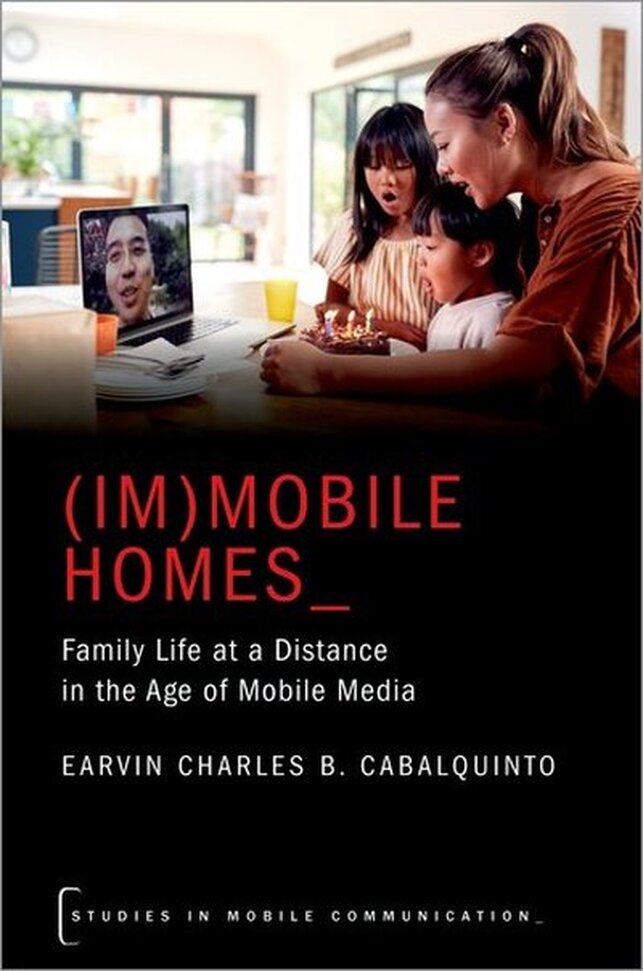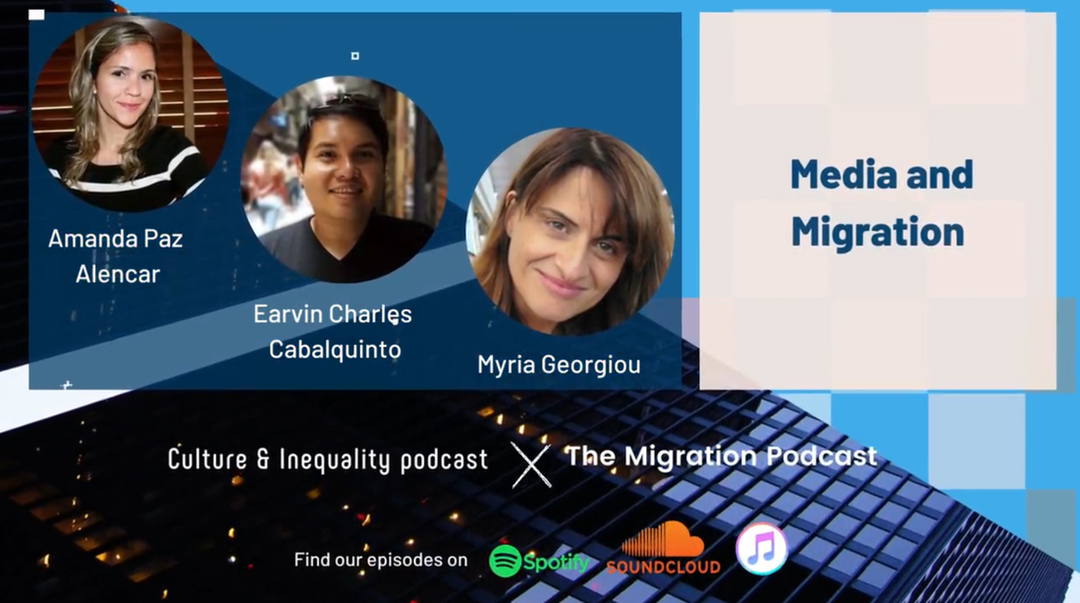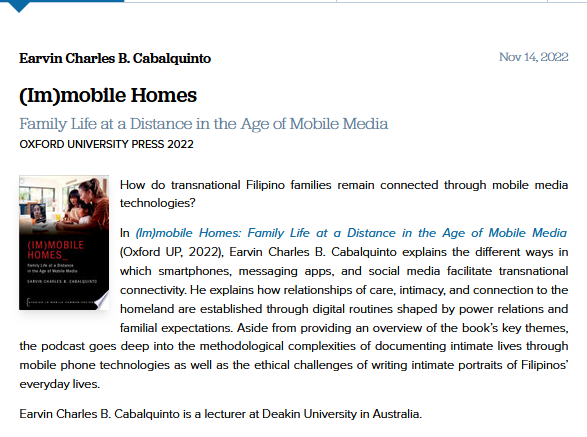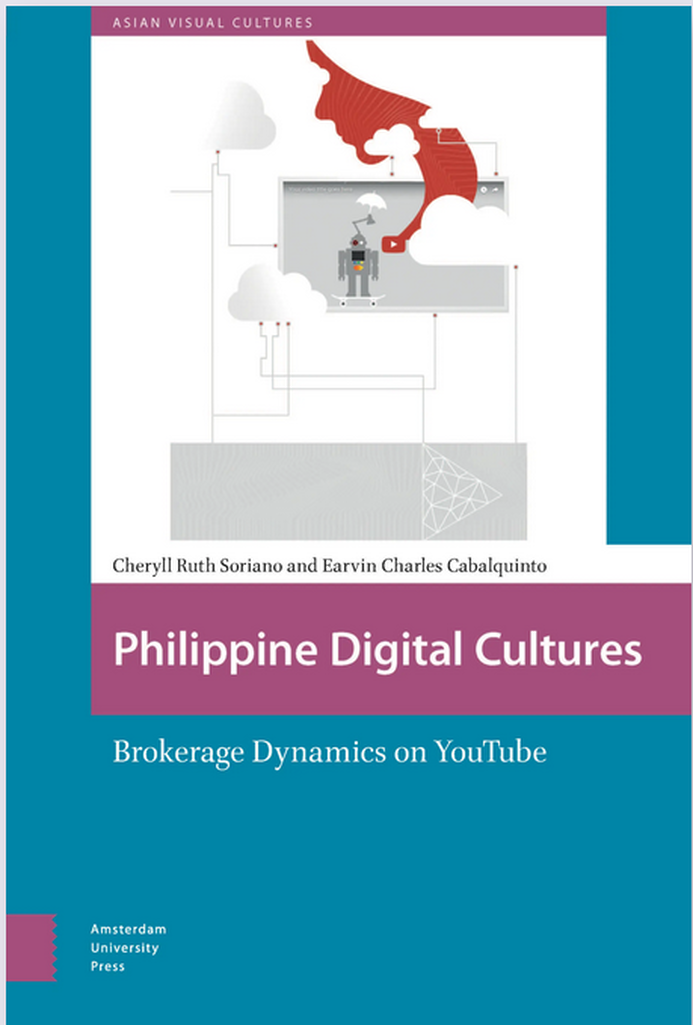BOOKS
(Im)mobile Homes: Family life at a distance in the age of mobile media, Oxford University Press. You can order the book here.
DESCRIPTION
The home has been on the forefront of rapid economic, political, social, and technological transformations for many individuals and families across the world. As a country reliant on the exportation of human labor to sustain its national economy, the Philippines exemplifies a valuable case study of the impacts of a globalized and networked society on the everyday dynamics of a transnational family arrangement. Despite ranking among the heaviest Internet users in the world, Filipino citizens are often left with no choice but to navigate digital and transnational environments orchestrated by the uneven distribution of both national and international resources and opportunities.
(Im)mobile Homes investigates the role of smartphones, social media channels, and various mobile applications in forging and sustaining intimate ties among dispersed Filipino family members. Examining the digital lifeworlds of transnational Filipino family in Australia, this volume draws on rich ethnographic study to explore the benefits of digital communication as well as the tensions enabled by the influences of socio-cultural structures, socio-economic conditions, technological affordances, and institutional policies and processes on mobile practices. It portrays the physically distributed yet virtually connected nature of the transnational Filipino family through diverse contexts, such as observing family rituals, performing intimate care, and managing crises, and foregrounds their unique strategies in addressing the interruptions of connecting at a distance. Ultimately, this volume underscores how mobile practices of the transnational Filipino family negotiate the pre-existing and broader structural systems that (re)produce marginalization in a digital and global era.
Enriched by moving stories of transnational families, (Im)mobile Homes offers a critical lens towards interrogating the possibilities and politics of a home from afar in the digital era.
FEATURE:
(IM)MOBILE HOMES: FAMILY LIFE A AT DISTANCE IN THE AGE OF MOBILE MEDIA
Book Review by Hong Chen in Asian Journal of Communication
"In this sense, this book concurs with the social shaping tradition of understanding technology (MacKenzie & Wajcman, 1999), which rejects a strong techno-determinist stance and highlights the co-constitution of technological engagement and the specific social-cultural contexts where the technology is consumed. Despite the specific focus on the Filipino context, this book certainly appeals to wider audiences concerned with the intersection of migration, transnational families, and digital media. Given the turbulence and uncertainties produced by Covid-19 crisis, the notion ‘(im)mobile home’ in this book is of particular relevance for those who are plagued by long-term familial separation, since anyone can become a transnational/translocal family member in this (im)mobile post-pandemic era."
Book Review by Yongjian Li in New Media and Society
"Nonetheless, this book provides a clear roadmap for future research on the care, labor, and digital intimacy practices of transnational families and labor migrants in the age of mobile media, offering insights into family life at a distance in the age of mobile media. Valuable to academics, learners, and readers who desire more critical knowledge of digital migration studies from a non-Western perspective."
Book Review by Linjie Dai in Information, Communication & Society
"(Im)mobile Homes is a valuable book that contributes theoretically and empirically to communication and migration studies. Scholars interested in mobile communication, digital media and migration, and transnational care work can benefit from the book. It would also appeal to policymakers and community organizers caring about migrants’ welfare."
"In this sense, this book concurs with the social shaping tradition of understanding technology (MacKenzie & Wajcman, 1999), which rejects a strong techno-determinist stance and highlights the co-constitution of technological engagement and the specific social-cultural contexts where the technology is consumed. Despite the specific focus on the Filipino context, this book certainly appeals to wider audiences concerned with the intersection of migration, transnational families, and digital media. Given the turbulence and uncertainties produced by Covid-19 crisis, the notion ‘(im)mobile home’ in this book is of particular relevance for those who are plagued by long-term familial separation, since anyone can become a transnational/translocal family member in this (im)mobile post-pandemic era."
Book Review by Yongjian Li in New Media and Society
"Nonetheless, this book provides a clear roadmap for future research on the care, labor, and digital intimacy practices of transnational families and labor migrants in the age of mobile media, offering insights into family life at a distance in the age of mobile media. Valuable to academics, learners, and readers who desire more critical knowledge of digital migration studies from a non-Western perspective."
Book Review by Linjie Dai in Information, Communication & Society
"(Im)mobile Homes is a valuable book that contributes theoretically and empirically to communication and migration studies. Scholars interested in mobile communication, digital media and migration, and transnational care work can benefit from the book. It would also appeal to policymakers and community organizers caring about migrants’ welfare."
Guest interview with Professor Myria Georgiou, Hosted by Associate Professor Amanda Alencar, The Migration Podcast, Special Episode: Migration and Media, IMISCOE (International Migration Research Network), Listen via the Website, Soundcloud, and Spotify.
I was interviewed by Prof Nicole Curato, a Professor of Political Sociology at the Centre for Deliberative Democracy and Global Governance at the University of Canberra, in the New Books Network podcast.
In the podcast, I spoke about my recently published book, "Im)mobile Homes: Family Life at a Distance in the Age of Mobile Media", published under the Studies in Mobile Communication series of Oxford University Press.
In the podcast, I spoke about the themes, methodological complexities, and ethical considerations in my work. You can access the recording via the New Books Podcast Website.
In the podcast, I spoke about my recently published book, "Im)mobile Homes: Family Life at a Distance in the Age of Mobile Media", published under the Studies in Mobile Communication series of Oxford University Press.
In the podcast, I spoke about the themes, methodological complexities, and ethical considerations in my work. You can access the recording via the New Books Podcast Website.
Philippine Digital Cultures: Brokerage Dynamics on YouTube, Cheryll Ruth Soriano and Earvin Charles Cabalquinto, Asian Visual Cultures series, Amsterdam University Press.
Order here.
DESCRIPTION
Social media platforms have been pivotal in redefining the conduct of contemporary society. Amid the proliferation of a range of new and ubiquitous online platforms, YouTube, a video-based platform, remains a key driver in the democratisation of creative, playful, vernacular, intimate, as well as political expressions. As a critical node of contemporary communication and digital cultures, its steady uptake and appropriation in a social media-savvy nation such as the Philippines requires a critical examination of its role in the continued reconstruction of identities, communities, and broader social institutions. This book closely analyses the diverse content and practices of amateur Filipino YouTubers, exposing and problematising the dynamics of brokering the contested aspirational logics of beauty and selfhood, interracial relationships, world-class labour, and progressive governance in a digital sphere. Ultimately, Philippine Digital Cultures: Brokerage Dynamics on YouTube offers a fresh, compelling, and nuanced account of YouTube as an important site for the mediation of culture, economy, and politics in Philippine postcolonial modernity amid rapid economic globalisation and digitalisation.
DESCRIPTION
Social media platforms have been pivotal in redefining the conduct of contemporary society. Amid the proliferation of a range of new and ubiquitous online platforms, YouTube, a video-based platform, remains a key driver in the democratisation of creative, playful, vernacular, intimate, as well as political expressions. As a critical node of contemporary communication and digital cultures, its steady uptake and appropriation in a social media-savvy nation such as the Philippines requires a critical examination of its role in the continued reconstruction of identities, communities, and broader social institutions. This book closely analyses the diverse content and practices of amateur Filipino YouTubers, exposing and problematising the dynamics of brokering the contested aspirational logics of beauty and selfhood, interracial relationships, world-class labour, and progressive governance in a digital sphere. Ultimately, Philippine Digital Cultures: Brokerage Dynamics on YouTube offers a fresh, compelling, and nuanced account of YouTube as an important site for the mediation of culture, economy, and politics in Philippine postcolonial modernity amid rapid economic globalisation and digitalisation.



